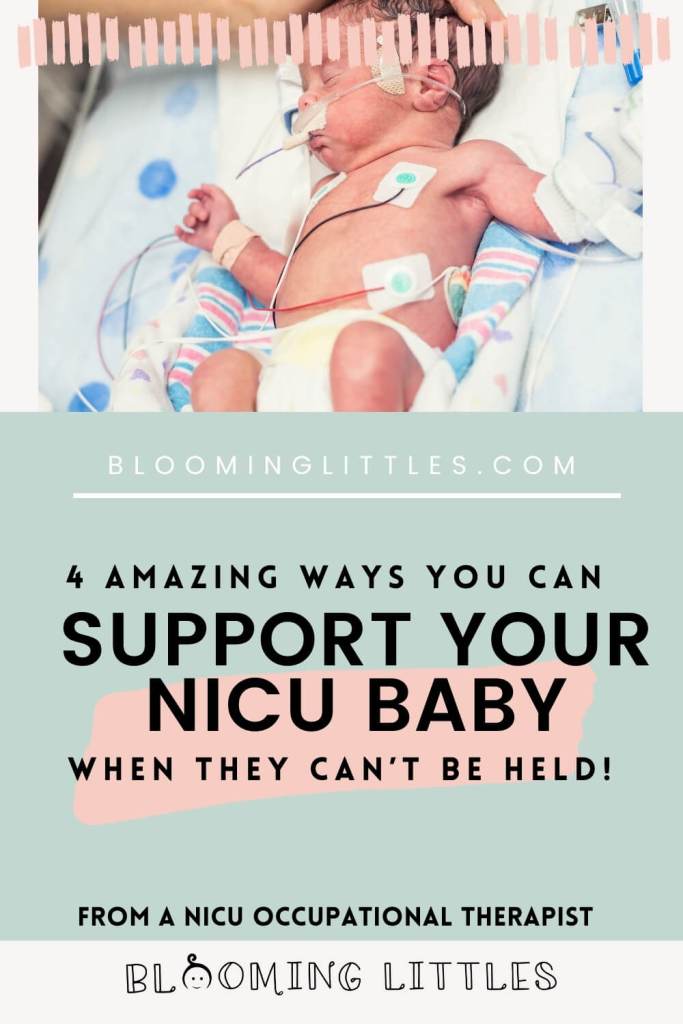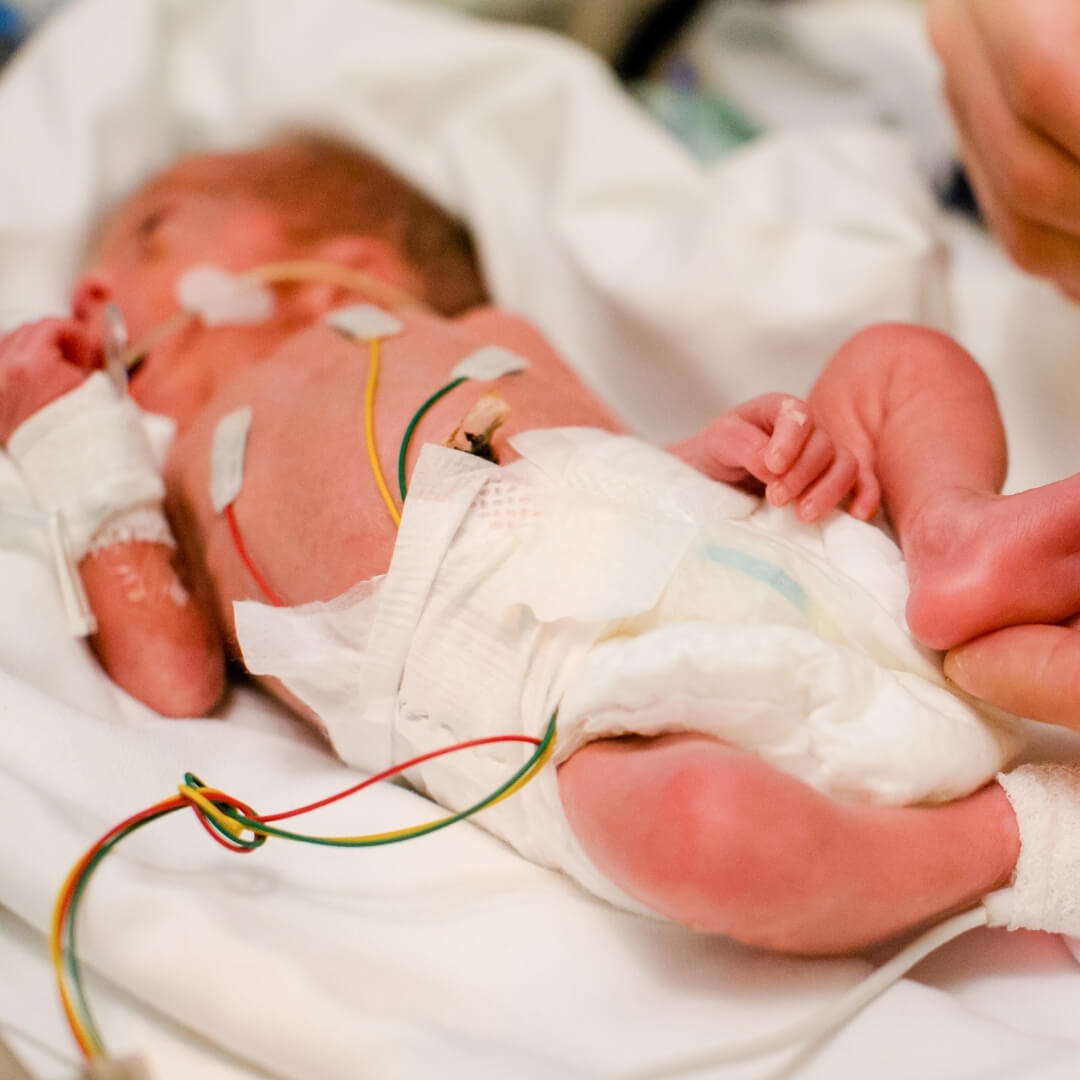
If you are a parent with a baby in the neonatal intensive care unit (NICU) and you haven’t been able to hold your baby…OR you’re going through a season of life in the NICU where your baby can’t be held—I want you to know there are ways you can be there for your precious one. Here are 4 ways you can be involved that support your baby’s short- and long-term developmental outcomes, even when they can’t be held.

I’ve been thinking a lot about NICU parents who aren’t allowed to hold their baby. I can see the eyes of moms aching, yet terrified. It’s one of the hardest parts about being in the NICU…waiting.
The NICU is a rollercoaster (as I’m sure everyone who’s experienced it can attest!) and things can change in the blink of an eye. There are many situations and circumstances that can prolong the time until babies in the NICU can be held.
The chance to hold may be delayed due to your baby’s
- prematurity
- unstable medical status
- medical lines
- surgical precautions, and/or
- breathing requirements.
The feeling of helplessness is heavy in the heart of every NICU parent. I want to provide you with something you CAN DO!
Here are 4 things you can do with your NICU baby when you aren’t able to hold them. Things that will boost your confidence AND their development.
1. GIVE A HAND HUG
Hand hugs can be a precious gift to NICU parents (and medical caregivers). It offers a way for you to provide your baby with some skin-to-skin touch and comforting input when they’re unable to be held.
A hand hug is when you place one hand on your baby’s head and the other hand is either
- cupping your baby’s feet OR
- placed over their arms/tummy while your baby is supported in a flexed (tucked) position.
You can also place a hand over your baby’s trunk (midsection) and cup the feet as another option.


There are several variations of a hand hug. If you’re wondering how you can adapt it for use with your baby, I did an entire post dedicated to hand hugs in the NICU here!
ONE THING I TEACH EVERY NICU PARENT TO DO WITH THEIR BABY—A HAND HUG!
I have heard parents say so many times, “He doesn’t like to be touched” or “She’s a touch-me-not”.
When you place your hands on your baby in a developmentally-supportive and nurturing way, you are shaping your baby’s brain.
You are…
- building positive sensory pathways
- supporting sensory processing skills
- promoting medical stability, and
- improving their tolerance to TOUCH!
Plus, lots more!
Because of your hand hugs, your baby will develop better tolerance to diaper changes, blood pressure checks, repositioning, transfers for holding, and interaction.
Always be responsive to your baby’s cues during a hand hug. Learning when your baby is showing you stress cues or happy, approach cues is important so you can help them develop strong coping skills.
If you can’t provide a hand hug, let your sweet one hold onto your finger. Even if they aren’t grasping yet, place your finger in their hand so they can experience your scent and comforting touch.
2. OBSERVE YOUR BABY’S MOVEMENTS
Now this one can be difficult because of the trauma that often comes with the NICU environment. Observing your baby may be really difficult for one mom, but may be the emotional release another mom needs. If it’s too triggering to stand at your NICU baby’s bedside and observe all their little movements and noises, that’s OK.
Take a step back and come back to the bedside when you feel like you’re ready.
No matter how early your baby was born, or how sick they are—you can always observe them.
EVERY SINGLE BABY in the NICU is different.
Each baby is unique and special. Each with their own communication style, special movements, and individual behaviors that make up who they are and what their NICU journey will be like!
This is a special time to get to know your baby.
You don’t have to be hands-on all the time in order to be a good NICU parent or show attention to your child.
Let me say that again…”you don’t have to be hands-on all the time in order to be a good parent!”.
In fact, in the NICU, there are times when it is more supportive to your baby when we’re hands off and prioritize our touch and interactions to certain times.
When it’s “hands-off time”, you can always OBSERVE!
Gazing at your baby through their isolette and studying the way their toes wiggle, their face twitches, or their little hands move, can help ground you in the moment and help you as you transition to the role of “mom” or “dad”.
That’s your baby.
I want to encourage you to observe your baby, but I also encourage caution and awareness as you peek into your baby’s isolette.
When observing any baby in the NICU, it’s important to be aware of their sensory environment.

The sensory environment relates to all of the touch, smells, sounds, movement, tastes, and interactions occurring in your baby’s surroundings. Such as:
- medical equipment beeping
- lights on overhead
- the medical team talking
- mom’s voice
- the smell of hand sanitizer
- being contained with a positioning device
- feeling their arms and legs move in space
- reflux or belly distress
Here’s a trick: if your baby has a cover over their isolette and/or is in a stage of development where their eyes need to be protected from direct light (babies younger than 35 weeks), open the isolette cover near the end of your baby’s bed. That way, you can observe without disrupting their environment or sleep.
I don’t want your baby to be overstimulated by their environment when we move their isolette cover and allow light into their healing space.
Let me know how your observations go! What sweet things does your baby do?
3. READ TO YOUR BABY
Yep, that’s right. You can read to your baby while they’re growing in the NICU. The beautiful thing about this, is that reading slowly and quietly at their bedside supports language, socio-emotional, and cognitive development.
You are providing your baby with positive listening experiences that help regulate their medical status and teach them to process the world around them .
Parents have told me they feel silly doing this. It can feel strange at first. Especially when you are in an open bay NICU environment, meaning there are multiple bed spaces next to each other instead of private rooms.
Mom…Dad…nothing is silly if it supports the development and medical stability of your baby.
Even if your baby is in an isolette, you can sit next to it and read quietly.

ONE / TWO / THREE / FOUR / FIVE / SIX / SEVEN / EIGHT
The isolette walls will muffle your voice similar to the womb. There’s no need to open the port holes of the incubator, your voice will carry to your baby in a developmentally-supportive way.
What if your NICU doesn’t let you bring items (like books!) into the unit? Don’t let that stop you! Go ahead and…
- make a story up,
- tell your baby a story about somewhere you’ve been,
- tell a popular story from memory,
- read a children’s story/nursery rhyme from your phone.
There’s an entire organization that focuses on supporting parents by encouraging reading in the NICU. It’s called NICU Book Club. Check them out on Facebook to hear from other NICU families who are reading to their babies or donate in support of their mission.
Here are a couple of testimonials they share on their page.
**Testimonials copied from the NICU book club Facebook page.
- “Reading to my daughter gives me relief, especially when she reacts to my voice. It strengthens our bond and brings us even closer. Not to mention the benefits she receives with brain development. It’s a tradition I plan on continuing outside of the NICU. Thank you for the opportunity and new routine!! “
- “We would read books with him every day. Doctor Seuss was our favorite. His sats were always perfect while we cuddled and read together. It added some normalcy to our days in the NICU. For that moment, it was just me reading my favorite stories to my son.”
YOU’RE NOT ALONE.
Parents are reading to their NICU babies around the world. Your sweet baby is thankful knowing you are there.
4. PARTICIPATE IN THEIR CARE
Even if you’re not able to get your baby out to hold them, you can still participate in their care.
Your baby will still need their diaper changed, their temperature taken, baths, and oral care.
Ask questions and get hands-on, so you can learn how to do some of these tasks. Your baby’s bedside nurse is happy to help you learn to parent in a new way.
I know you weren’t planning on changing a diaper the size of a credit card…I have some tips to make it easier.
And always remember, your baby wants you to do her care…even when it’s terrifying.
She wants to smell your scent as you open the doors of the isolette.
She wants to feel the touch of your skin on hers as you give her a hand hug before you start her care.
She wants to hear the soft whisper of your voice as you say, “Hi sweet one! It’s time for a diaper change. I’m so proud of you.”
There are so many reasons your baby wants you to be involved.
You are…
- building attachment,
- shifting into the role of mom and dad,
- gaining confidence,
- learning about your baby, and
- creating positive brain pathways.
If you’re in a season where you can’t hold your baby, I truly hope that day is near.
Until then, know that your presence and involvement in your baby’s care at this stage in their journey is INCREDIBLY important for your sweet baby’s overall development and long-term growth.
I hope you can try some of these things today.
- Give your baby a hand hug.
- Observe their fingers and toes wiggle as they move in their isolette or crib (just be sure to protect them from that light).
- Read a story to your baby.
- Start changing diapers, taking temperatures, and participating in oral care.
I’m prayerful that the day you can hold your baby is near!
Is there anything special you do (or did!) when your baby can’t be held?
What has helped you bond with your baby?
I’m proud of you.

